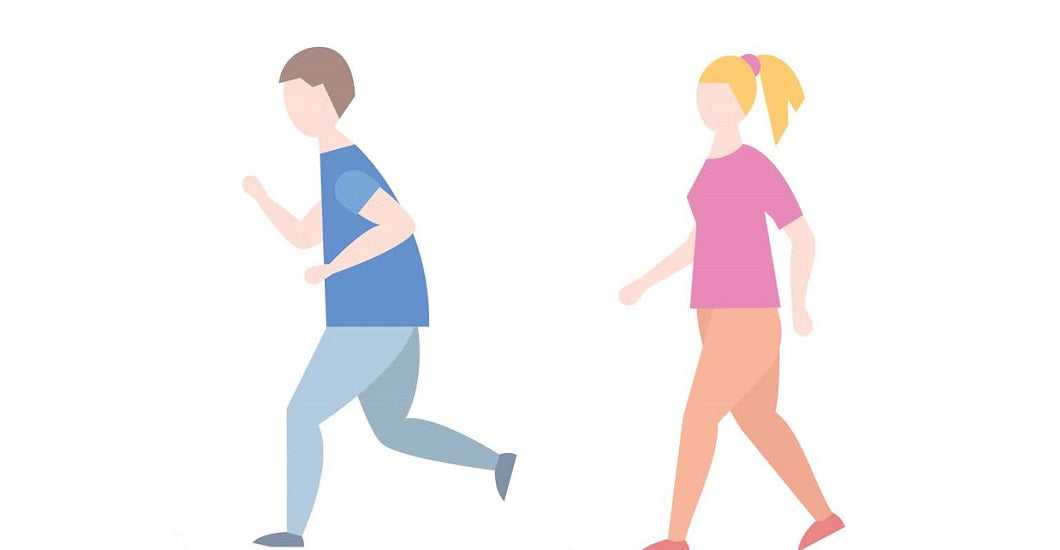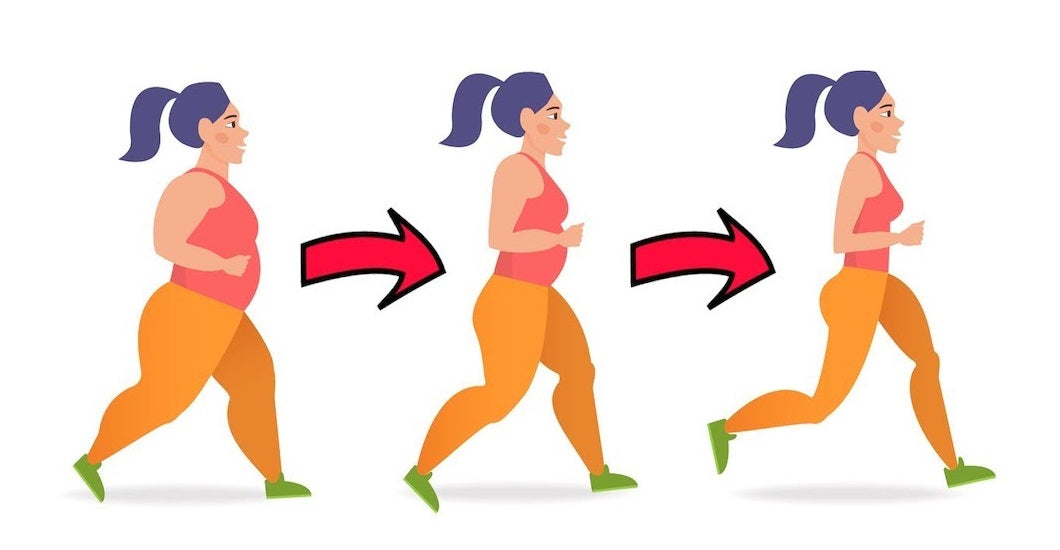Whether walking is better than running depends on various factors, including individual goals, fitness levels, and health conditions. Both walking and running are valuable forms of aerobic exercise, each offering unique benefits. Let's explore the advantages and considerations of both activities.
Definition Of Walk
Walking is a basic human locomotor activity that involves moving on foot by alternately lifting one foot and then the other, with at least one foot in contact with the ground at all times. It is a natural form of bipedal movement and is a primary means of transportation and physical activity for humans.
During walking, the body's weight is shifted from one leg to the other in a rhythmic manner, creating a continuous cycle of steps. The movement involves coordinated actions of various body parts, including the legs, hips, arms, and core muscles. Walking typically occurs at a slower pace compared to running and is characterized by a steady gait pattern.
Walking is a means of transportation and a popular form of exercise for people of all ages and fitness levels. It is a low-impact activity that can be easily incorporated into daily routines, offering numerous health benefits, including improved cardiovascular health, muscle strength, joint flexibility, and mental well-being. Additionally, walking is accessible and requires no special equipment, making it a convenient and sustainable form of physical activity.
Definition Of Running
Running is a form of human locomotion that involves moving rapidly on foot by propelling the body forward with a sequence of coordinated strides. It is a natural gait where both feet are off the ground simultaneously during each step, differentiating it from walking, where at least one foot is always in contact with the ground.
During running, the body's weight is momentarily supported by one leg at a time while the other is in the air, creating a moment of flight. This cycle of continuous strides allows for a faster pace compared to walking. Running requires higher muscular effort and coordination, engaging various muscle groups throughout the body, including the legs, core, and upper body.
Running is a fundamental human skill and a popular recreational activity, sport, and form of exercise. It is commonly used for cardiovascular fitness, endurance training, weight loss, and as a competitive sport in various track and field events, marathons, and other racing competitions.
While running offers numerous health benefits, such as improved cardiovascular health, enhanced lung capacity, and increased calorie burning, it is a higher-impact activity that may pose a greater risk of injuries, particularly to the joints and muscles, compared to lower-impact activities like walking. Proper warm-up, footwear, and gradual training are essential to minimize the risk of injury and enjoy the benefits of running safely.
Benefits Of Walking
Walking offers a wide range of health benefits, making it a simple and effective form of physical activity. Here are some of the key benefits of walking:
Cardiovascular Health:
Regular walking improves heart health by increasing heart rate and circulation. It can help lower blood pressure, reduce the risk of heart disease, and improve overall cardiovascular fitness.
Weight Management:
Walking is an excellent way to manage or support weight loss efforts. It burns calories, helps maintain a healthy metabolism, and can contribute to fat loss when combined with a balanced diet.
Joint Health:
Walking is a low-impact exercise that is gentle on the joints, making it suitable for individuals with joint issues or those recovering from injuries. It helps improve joint flexibility and strengthens the muscles around the joints.
Muscle Strength and Tone:
Walking engages various muscle groups, including the legs, core, and glutes. Regular walking can help improve muscle strength and tone in these areas.
Bone Health:
Weight-bearing activities like walking can enhance bone density and reduce the risk of osteoporosis, especially in older adults.
Mental Health:
Walking can positively affect mental well-being, reducing stress, anxiety, and depression. It releases endorphins, the "feel-good" hormones, promoting relaxation and improved mood.
Improved Sleep:
Regular physical activity like walking can improve sleep quality, leading to better rest and overall well-being.
Boosted Immune System:
Engaging in moderate exercise like walking can enhance the immune system, making it more effective in fighting illnesses and infections.
Better Cognitive Function:
Walking has been associated with improved cognitive function and memory in older adults, contributing to brain health and reducing the risk of cognitive decline.
Accessibility and Convenience:
Walking requires no special equipment and can be easily incorporated into daily routines. It is an accessible form of exercise for people of all ages and fitness levels.
Longevity:
Research suggests that regular walking increases longevity, contributing to a healthier and longer life.
Social Interaction:
Walking with friends and family or in groups can provide social interaction and support, further enhancing mental well-being.
Walking is a low-cost, low-impact, and highly beneficial form of exercise that can significantly improve overall health and quality of life. Incorporating regular walks into one's daily routine can be an essential step toward maintaining a healthy lifestyle.
Benefits Of Running
Running offers many health and fitness benefits, making it a popular and effective form of aerobic exercise. Here are some of the key benefits of running:
Cardiovascular Health:
Running is an excellent cardiovascular workout that strengthens the heart and improves circulation. Regular running can lower blood pressure, reduce the risk of heart disease, and improve overall cardiovascular fitness.
Weight Control:
Jogging is an activity that burns a significant amount of calories, which can assist in losing weight and keeping it off. It helps burn more calories per minute compared to many other forms of exercise, contributing to effective weight management.
Improved Lung Function:
Running increases lung capacity and improves respiratory efficiency, enhancing the exchange of oxygen and carbon dioxide during breathing.
Bone and Joint Health:
Running is a weight-bearing exercise that stimulates bone density, reducing the risk of osteoporosis and promoting bone health. Contrary to some beliefs, running has not been shown to increase the risk of osteoarthritis in healthy individuals.
Muscle Firmness and Power:
Running involves multiple muscle clusters across the body, encompassing the legs, core, and upper body. It helps tone and strengthen muscles, leading to improved overall body strength.
Mental Health and Mood:
Running triggers the release of endorphins, natural mood elevators that can help reduce stress, anxiety, and depression. It can also promote a sense of accomplishment and improved mental well-being.
Increased Energy and Stamina:
Regular running can boost energy levels and increase stamina, making daily tasks and physical activities less tiring.
Better Sleep:
Running can improve sleep quality, leading to more restful and rejuvenating sleep.
Immune System Support:
Moderate and consistent running can strengthen the immune system, reducing the likelihood of contracting infections and illnesses.
Cognitive Benefits:
Running has been linked to improved cognitive function, memory, and mental clarity.
Social Interaction:
Running groups or clubs provide opportunities for social interaction and a sense of community, promoting a more enjoyable running experience.
Goal Achievement:
Setting and achieving running-related goals, such as completing a race or increasing distance, can boost self-confidence and motivation.
Time Efficiency:
Running can be a time-efficient exercise option for those with busy schedules, as it allows individuals to cover more distance in a shorter period than walking.
It is important to note that while running offers many benefits, it is a high-impact activity that may not be suitable for everyone, especially those with certain health conditions or joint problems. If starting a running program or any new exercise routine, it is advisable to consult with a healthcare professional or fitness expert to ensure it is safe and appropriate for individual circumstances.
Walking VS. Running
|
Comparison Criteria |
Running |
Walking |
|
Intensity |
High intensity |
Low intensity |
|
Caloric Burn |
More calories burned |
Fewer calories burned |
|
Cardiovascular Benefits |
Greater benefits |
Good benefits |
|
Impact on Joints |
High impact on joints |
Low impact on joints |
|
Muscle Engagement |
Engages various muscles |
Less muscle engagement |
|
Fitness Goals |
Weight loss, races, etc. |
General health, relaxation |
|
Accessibility |
Requires more effort |
Easily accessible |
|
Mental Health Benefits |
Stress reduction |
Stress reduction |
|
Injury Risk |
Higher risk of injuries |
Lower risk of injuries |
|
Sustainability |
May be challenging long-term |
Sustainable long-term |
Run/Walk Inside Or Outside
Running or walking outside offers numerous physical, mental, and emotional benefits. Whether you choose the intensity of running or the leisurely pace of walking, spending time in nature while exercising can revitalize your mind and body, fostering a deeper appreciation for the world around you. So, put on your running shoes or grab your walking gear, head outside, and enjoy the uplifting experience of outdoor exercise.
Sometimes you can't run or walk outside because the conditions are poor. At this time, what can you do?
My suggestion is to get one 2 in 1 folding treadmill in SupeRun. In the conventional form, it is a treadmill. When the handrails are folded, it becomes a desk walking treadmill so you can walk while working. Both walking and running are good exercises for a sedentary lifestyle.
Conclusion
Choosing between walking and running depends on individual goals, fitness levels, health conditions, and personal preferences. Doing both activities can help you stay fit and avoid getting hurt. Before starting a new exercise routine, it is crucial to consult with a healthcare professional or fitness expert. This is especially important if you have any health issues or restrictions.






Leave a comment
All comments are moderated before being published.
This site is protected by hCaptcha and the hCaptcha Privacy Policy and Terms of Service apply.